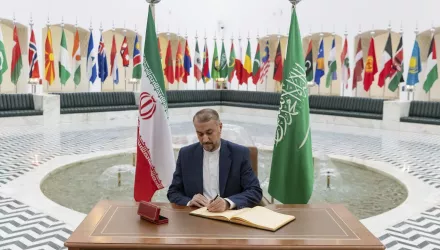Less than a month before talks between the United States, Iran and other world powers begin, three distinguished experts met last night (September 16) at the John F. Kennedy Jr. Forum to discuss how the western world should handle such a controversial regime.
The event titled “Iran: War…or Peace?” was moderated by Nicholas Burns, professor of the practice of diplomacy and international politics, who oversaw negotiations with Iran during his tenure as undersecretary of state for political affairs (2005-08).
He was joined on the panel by Elliott Abrams, senior fellow for Middle Eastern Studies at the Council on Foreign Relations, and Mohsen Milani, professor of politics and chair of the department of government and international affairs at the University of South Florida.
In his introduction Burns identified three specific challenges that the Islamic Republic of Iran posses to the U.S. and its allies—Iran’s nuclear weapons capability, its funding of terrorist groups in the Middle East, and its proximity to Iraq and Afghanistan.
“Just as you go to war with the army you have, not the army you want to have,” said Milani, who admitted quoting former Secretary of Defense Donald Rumsfeld. “You negotiate with the government that is in power, not the government that you want to have in power.”
Abrams, who worked for nearly 10 years on the National Security Council, echoed many neoconservative views and argued that the United States should not enter talks with Iran without being tougher on the current regime.
“We have been trying under the last two administrations and now a third to avoid Iran getting a bomb,” Abrams said. “We need to act to create a middle option -- using diplomacy, negotiations and sanctions as options. Right now we are not getting the support we need from Russia, China and others.”
Abrams and Milani agreed the United States must reach out to the people of Iran to gain a better understanding of the country. But Abrams faulted the Obama administration for not taking a more unequivocal stance following the June elections in Iran, when thousands took to the streets in protest of President Mahmoud Ahmadinejad’s claimed victory and were met with violence and mass arrests.
“I think the President made an argument that we should not get in the middle of it,” Abrams said. “It’s not obvious what side we are on. I think it was particularly poignant that he hasn’t put us on the side of people fighting for democracy in their own country.”
However, Milani argued that the United States cannot impose democracy on Iran, which currently operates under a hybrid system of partial theocracy and partial elite-controlled government.
“Democracy is not like an automobile,” Milani said. “You don’t export it—it can’t be done. It has to be something that the people desire and they have to come to the conclusion that they need.”
Burns said that Iran is one of the most dangerous foreign policy challenges for the United States and its allies.
“If we miscalculate, we could end up in a war,” Burns said after the forum. “It is my personal view that we need to exhaust diplomacy. It would be a great mistake in light of what has happened in Iraq.”
Kneezle, Sarah. “Forum Panelists Discuss Options for U.S.-Iran Talks.” September 17, 2009




